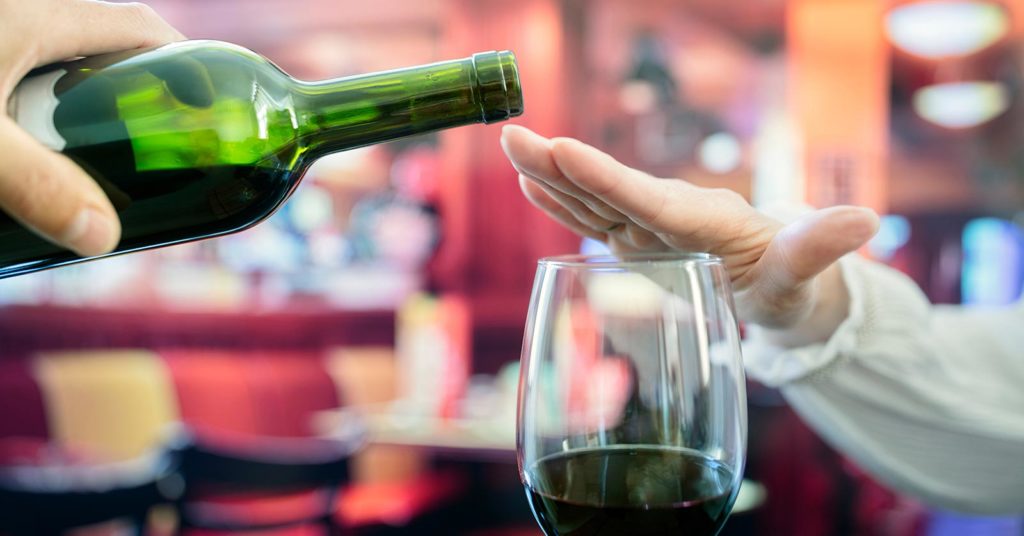
Stress at work, home and personal relationships was amplified by COVID-19. Many of us who were casual or occasional drinkers turned a weekend treat into a weekday habit. You’ve noticed the changes; it’s like adding gasoline to a fire. Don’t beat yourself up over it. There are big benefits of quitting drinking and we’ll share them with you here so you can become motivated.
How Are You Feeling?
The biggest indicator that overindulging in alcohol is how you feel. Here’s the triple threat:
Weight Gain
A bottle of wine or a six pack of beer has over 600 empty calories. Alcohol consumption also stimulates our desire for carbohydrates. (McCormick 2020) Tipsy eating is usually bad eating. Are you going to eat a salad after a wine binge or a burger and fries? Some drive-thru restaurants have dubbed this the “4th Meal”.
Hangover
Waking up with a headache every morning is a sign that your glass of wine may have turned into a bottle or more. Dehydration is a big part of a hangover. Alcohol consumption can inhibit glucose production in the body and deplete the reserves of glucose stored in the liver. Because glucose is the main energy source of the brain, low blood sugar can produce symptoms of fatigue, weakness and mood disturbances experienced during hangovers (Buddy T. 2020).
Headache
Alcohol intoxication can result in the dilation of blood vessels, which can lead to a headache. Alcohol consumption also affects histamine, serotonin, and prostaglandins, hormones thought to contribute to headaches. (Buddy T. 2020) Your brain is a complex organ and requires healthy habits just like the rest of our body. Increased alcohol consumption over time will have long-term affects on your brain health.
These are just a few of the affects with strong physical symptoms. There are more scientific studies that will convince you further that drinking too much is bad for your overall health. None of the mentioned after-affects is going to motivate a trip to the gym. Surely you realize the unhealthy snowball resulting from alcohol binging.
The Big Benefits of Quitting Drinking
Lose Weight
Drinking a bottle of wine is equivalent to consuming 20 packs of sugar. It’s no wonder there are no nutritional facts on a bottle of wine. By simply eliminating nightly cocktails or weekend binges, you can potentially shed a couple of pounds by month’s end (Kramer 2020).
Better Sleep
Consuming alcohol forces your brain to work in alpha waves, which is a meditative or resting wave state we typically experience when we’re awake. With these hormones, chemicals and brain waves out of whack, you’ll find yourself waking up in the middle of the night-or needing to nap at work. So, alcohol does a number on the brain awake or asleep. You may believe it makes you sleepy, but the kind of restorative sleep won’t happen. Substitute the glass of wine or mixed drink for a cup of caffeine-free chamomile, passionflower or lavender tea (Burkheiser 2019).
More Time and Energy
If we ask most adults what their two biggest contributors to the daily derailing of productivity are, the answer will most likely be the need for more time and energy. Less time recovering from the night before will automatically give you more productive time and increased energy. Take those two newfound positives and make time for a brisk walk or take an hour at the gym. Give yourself some “me” time. You won’t find it in a bottle. Even better, put on your headphones and listen to an audio book, take a class, invest in making every minute of every day about positivity. You’ll see the change in your mood and energy almost immediately.
Check with Your Doctor
Letting your doctor know your plans is a good first conversation to have. Most of us will check the box as a “social drinker” on a medical questionnaire, but we may need to have a different conversation with the truth when creating a drinking cessation program. If you have turned into more than a social drinker, it’s a good idea to check-in with your doctor to create accountability and a health plan that works for you and your body. We are all different and our bodies react differently to change. Make sure your resolution is healthy and something you can stick with, safely.
You Can Do This!
Just like any change in our lifestyle, it is a day-to-day process. Keep a calendar or journal of your journey to sobriety. It will be a helpful reminder of the negative, unhealthy things you let go of and a celebration of a noteworthy accomplishment. You’ll be a better Mom, Dad, Sister, Aunt, Uncle to your family and your significant other.
If you need help or support, there are 12-Step and free support groups to deal with alcoholism and any other kind of addiction through SAMSHA (Substance Abuse and Mental Health Services Administration). For more information, visit https://www.samhsa.gov/
Works Cited
T, Buddy. “The Best Cure for a Hangover Is to Avoid One.” Verywell Mind, 8 Feb. 2020. www.verywellmind.com/the-causes-of-a-hangover-67348.
McCormick, Allie. “Will I Lose Weight If I Stop Drinking Alcohol?” Sober Alley | Fasting + Fitness For Women, 19 Dec. 2020, soberalley.com/lose-weight-stop-drinking.
Kramer, Jillian. “What Happens to Your Body When You Quit Drinking.” EatingWell, www.eatingwell.com/article/291290/what-happens-to-your-body-when-you-quit-drinking/.
Berkheiser, Kaitlin. “Teas That Help You Sleep.” Healthline, 21 Oct. 2019, www.healthline.com/nutrition/teas-that-help-you-sleep.
